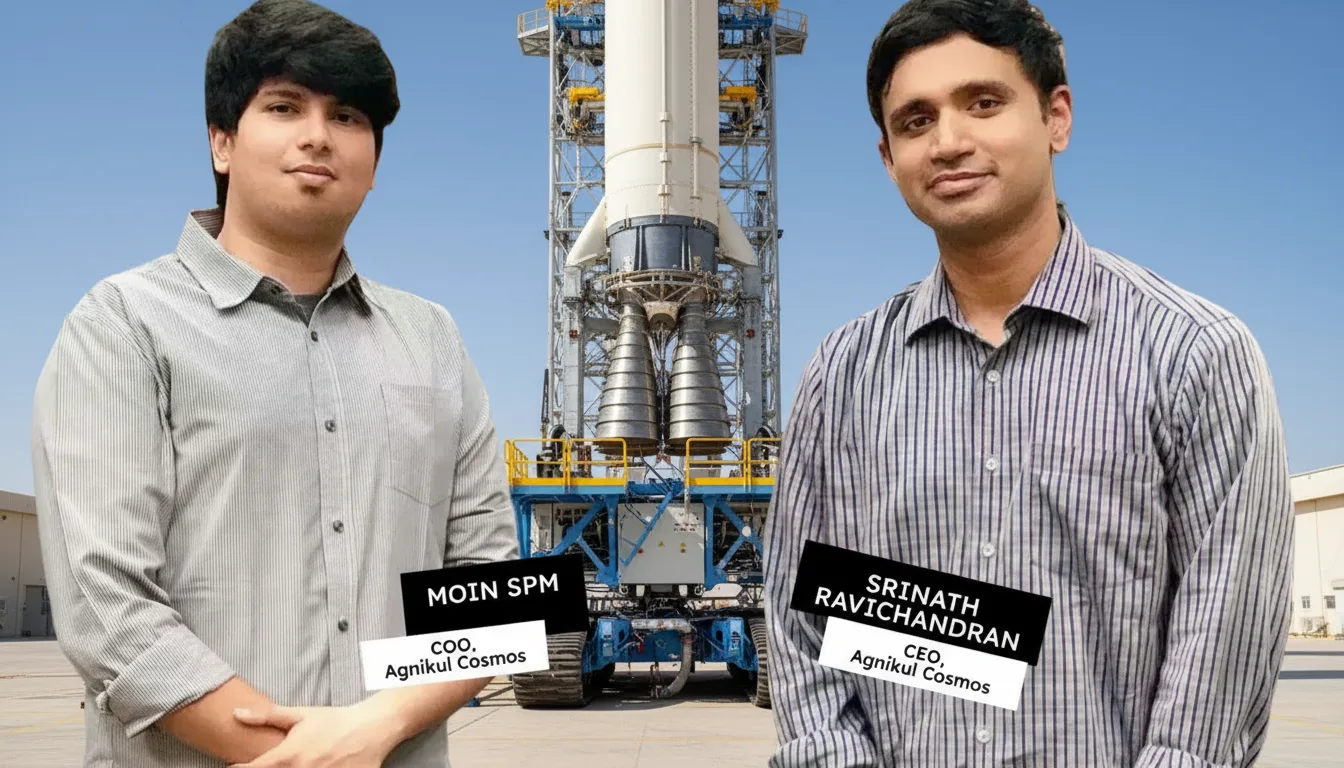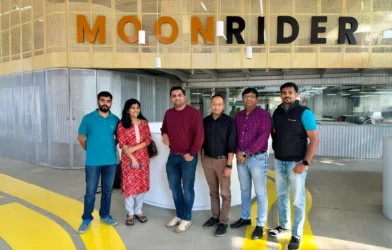Agnikul Cosmos, a Chennai-based space tech startup incubated at IIT Madras, is on a mission to make space access as easy as air travel. The company is reimagining rocket design with 3D-printed single-piece engines and mobile private launchpads, aiming for 50 launches a year by 2028. With its breakthrough technology and focus on cost efficiency, Agnikul is driving the vision of democratising space for small satellites and beyond.
From Vision to Reality
Founded in 2017 by Srinath Ravichandran and Moin SPM, Agnikul Cosmos was born from a dream of making space access rapid and flexible. The idea came when Ravichandran, while living in Los Angeles, noticed how small satellites struggled to secure rides on larger rockets.
The founders reached out to experts in India and gained support from Professor Satya Chakravarthy at IIT Madras, along with mentorship from RV Perumal, a retired ISRO veteran. Together, they developed Agnilet, the world’s first single-piece 3D-printed semi-cryogenic engine, which was test-fired in 2021 and patented in 2022. In 2023, the team carried out the sub-orbital test flight of Agnibaan SOrTeD, lifting off from their private launchpad at Sriharikota, Andhra Pradesh.
3D Printing for Affordable Space Access
By using 3D printing, Agnikul can manufacture rocket engines in just three days—dramatically faster than conventional methods. The number of engine parts has also been reduced from 14 to one, lowering complexity and cost.
“Making a ride to space as affordable and accessible as a ride to any other point on Earth is what defines success for Agnikul,” Ravichandran explains.
This approach aligns with the startup’s mission to provide dedicated, low-cost launch solutions for small satellites. With India’s space sector rapidly expanding, Agnikul is positioning itself as a pioneer in affordable space launches.
India’s First Private Launchpad
In 2022, Agnikul developed India’s first private and mobile launchpad. This innovation required rethinking plumbing, electronics, and software for portability, while ensuring safety and precision. Every component was engineered for mobility and compatibility with national space infrastructure.
The journey wasn’t easy. “We had two countdown aborts before our successful launch, caused by ground system issues. These highlighted the need for ground systems to meet the same quality standards as flight systems,” Ravichandran says.
Despite challenges, the mobile launchpad gives Agnikul flexibility to launch rockets from different locations, a significant advantage in the evolving space industry.
Scaling Towards 50 Launches a Year
From a business perspective, Agnikul Cosmos aims to launch one rocket every two weeks by 2028. This would mean 50 launches annually, supporting global demand for satellite deployment. To achieve this, the startup must build a reliable supply chain of punctual and quality-conscious suppliers while maintaining rigorous safety and precision standards.
Sustainability also plays a role. Although the rockets use kerosene and liquid oxygen—which are not fully eco-friendly—the company is committed to efficient fuel combustion and ensuring no part of the system is wasted. In addition, strict de-orbiting protocols guarantee that unused rockets are safely de-orbited after completing their missions.
Challenges and Opportunities for India’s Space Ecosystem
Ravichandran emphasizes that investor awareness of the space tech sector must grow. Clearer government signals about the viability of private space companies, along with awarding contracts to tech-mature startups, could give the ecosystem a major boost.
India’s role in the global space economy is already expanding. In 2023, India held 2.9% of the global space launch services market, the fastest-growing share in Asia-Pacific. By 2030, the Indian market is projected to reach $1.66 billion, according to Grand View Research.
Globally, the space launch services market is forecast to grow from $16.4 billion in 2024 to $46.1 billion in 2033, at a CAGR of 11.28% (Research and Markets). With rising demand for satellite constellations supporting communication, navigation, and Earth observation, Agnikul’s timing is ideal.
Conclusion
With its 3D-printed engines, private launchpads, and a bold target of 50 launches a year by 2028, Agnikul Cosmos is redefining space access. Backed by IIT Madras expertise and ISRO mentorship, the startup is set to play a key role in democratising space while supporting India’s growing presence in the global space economy.
Disclaimer: This article is based on information originally published by YourStory. All rights and credits for the original reporting belong to YourStory and the respective author. The content here has been adapted for informational purposes.









